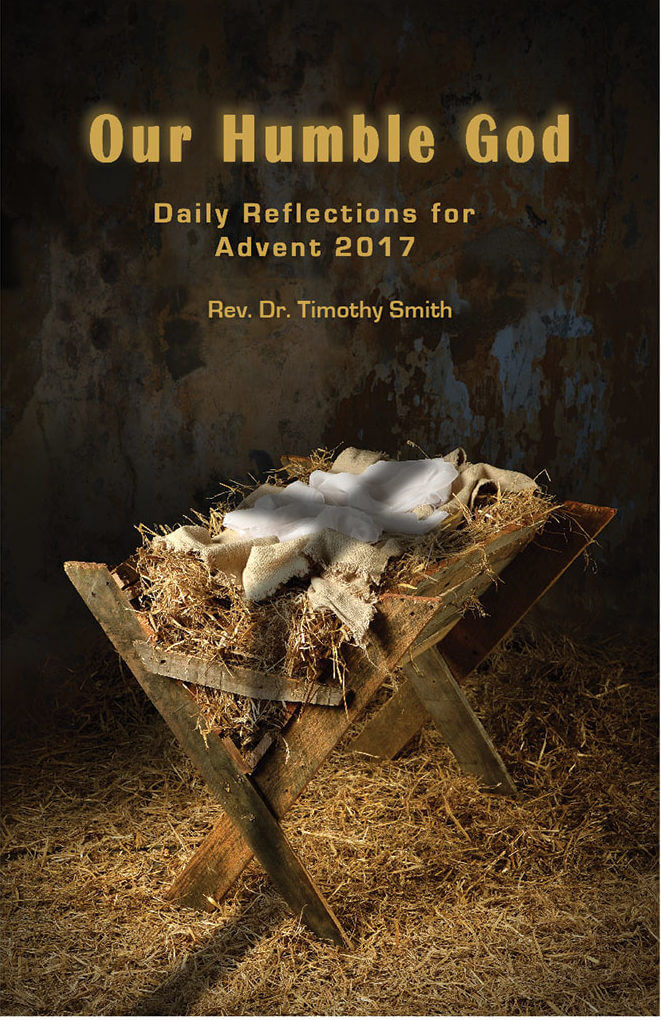PRAY:
Settle yourself into prayer and get ready to reflect on the Word of
God.
READ:
And being found in human form, he humbled himself and became
obedient to the point of death—even death on a cross.
Therefore God also highly exalted him and gave him the name that is
above every name, so that at the name of Jesus every knee should bend,
in heaven and on earth and under the earth, and every tongue should
confess that Jesus Christ is Lord, to the glory of God the Father.
Philippians 2:7b-11
What must those shepherds have thought when they first saw the redfaced, squirming newborn Messiah? Did they believe what their eyes told them? They heard angels rejoicing in His birth, but find Him lying helpless in a barn!
The soulful Christmas carol “What Child Is This?” wrestles with the contradictions of Jesus’ birth. The song wonders as the shepherds must have wondered: “Why lies he in such mean estate/Where ox and ass are feeding?” The probing lyrics of this song were written in 1865 by William Chatterton Dix, a Scotch insurance manager. The words came to him after being struck down by a near fatal disease, resulting in many months spent in bed. Dark depression overcame Dix, driving him to pray and search the Bible. During those long months Dix experienced a deepening in his faith, leading him to write hymns. The most loved is “What Child Is This?”, in which Dix marvels at the Christ Child’s humble birth.
Wise men and common folk do marvel that the Christ Child could lie in “such mean estate”. “The stable stinks like all stables do. The stench of urine, dung, and sheep reeks pungently in the air. The ground is hard, the hay scarce…A more lowly place of birth could not exist.” (Max Lucado, It Began in a Manger) Ah yes! What Child is this!
In today’s scripture Paul tells us yet more about this Child asleep in the hay. Paul eagerly looks ahead to the day when all creation bows in worship, confessing Jesus as Lord. He reveals that Christ’s reign will be universal, even cosmic, as all creatures hail Him. The phrase “those in heaven” refers to all angels, powers of heaven, and dark demonic forces bowing before the Christ; “those on earth” takes in the whole of those living on earth when Christ returns in glory; and “those under the earth” encompasses even the dead raised on the Last Day to stand before Christ, to give account, and to confess Him.
Elsewhere in Scripture Paul exults in Christ fulfilling the Father’s mandate “to gather up all things in him, things in heaven and things on earth” (Ephesians 1:10). Paul explains that “in him [Christ] all the fullness of God was pleased to dwell, and through Him God was pleased to reconcile to himself all things, whether on earth or in heaven, by making peace through the blood of his cross” (Colossians 1:19-20).
Because Christ so humbled Himself and poured out His life, God intervened to exalt Him over all things. By this God vindicated the humility of Jesus, reversing the shame of His cross, and bestowing on Him the name above all names. When Paul talks about God giving Jesus a “name”, he is talking about God giving Him a new reputation or new honor. He will now forever be known and worshipped as the God who, out of infinite love, humbled Himself to serve.
John Calvin observed that in Christ’s exaltation He “returns as something more than when he left. He returns as a human. He is still God, but now he is also human.” (Commentary on Philippians) As Jesus now reigns at the Father’s right hand, He is still human. He feels with us in all of our joys and sorrows!
Fiction writer Madeleine L’Engle wonders if in light of Christ’s incomparable humility there is anyone “brave” enough to look upon the Christ Child:
What one of us can understand a love so great that we would willingly limit our unlimitedness, put the flesh of mortality over our immortality, accept all the pain and grief of humanity, submit to betrayal by that humanity, be killed by it, and die a total failure (in human terms) on a common cross between two thieves?…Cribb’d, cabined, and confined within the contours of a human infant. The infinite defined by the finite…Why would he do such a thing?” (The Irrational Season)
In eternity we will wonder and rejoice that God would humble Himself to do such a thing! Today, let us also wonder and rejoice!
REFLECT:
- Imagine hearing the Christmas story for the first time. What about the story amazes and surprises? Take a moment to talk with God about this.
- Pray by asking the Holy Spirit to renew the gift of wonder that God would so humble Himself for you.
“Oh! Wondrous humility of my God; a deserted stable, mean
swaddling-clothes, incommodious manger, lowly birth, teach me to
humble myself: Adorable Jesus, Divinity hid in flesh like mine, gracious
Saviour instruct me, bring down my mind, reform my heart, cure
my pride, give me humility, and with it Thy grace, Thy love, and Thy glory.”
Jean Baptiste É Avrillon, A Guide for Passing Advent Holily


